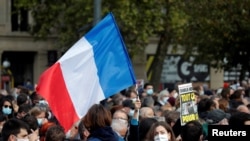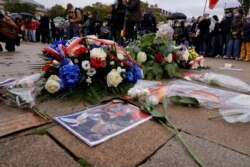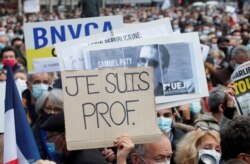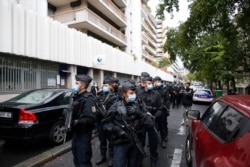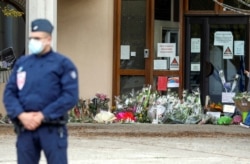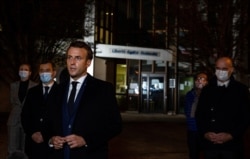France saw countrywide rallies defending free speech and secularism Sunday, while the government discussed a stronger response to Islamist extremism following the brutal killing of a French schoolteacher last week.
Masks firmly on, per the capital’s coronavirus rules, tens of thousands assembled at the Place de la Republique in Paris and several other major cities following Friday’s beheading of middle school history teacher Samuel Paty. Some waved French flags and brandished banners celebrating free expression, as speakers paid a somber tribute to the country’s latest victim of terrorism.
A national commemoration takes place Wednesday in honor of Paty, who died in the Paris suburb of Conflans-Sainte-Honorine.
In some ways, the outpouring of shock and grief is a repeat of nearly six years ago, when millions of pencil-brandishing protesters defended free expression, following the terrorist attacks targeting the offices of the Charlie Hebdo satirical magazine.
“Free expression is a cardinal value of our identity,” Prime Minister Jean Castex told Le Journal du Dimanche weekly newspaper, while speakers at Sunday’s rallies warned against responding to hate with hate.
Reprising the “I am Charlie” slogan following the January 2015 attacks, Castex added, “I am more than ever Charlie.”
But despite calls of national unity after this second terrorist attack in less than a month, the moment is also being marked by division and criticism over the government’s response to radical Islam.
It also comes amid — and is partly shaped by — the country’s very different battle against another crisis, the coronavirus pandemic.
“It’s them or us,” titled Le Point magazine in an editorial on the killing, while the regional Le Telegramme wrote that Friday’s attack “reminds us to what extent our French model of education and separation of church and state is threatened.”
Prophet Muhammad cartoons
Nearly a dozen people are being held for questioning in Paty’s killing, which took place as he headed home from class. They include the family of the suspect, an 18-year-old Chechen refugee identified by officials as Abdoullakh Anzorov, whom police shot dead shortly after he allegedly stabbed and decapitated his victim.
Posting an image of Paty on Twitter after killing him, the alleged assailant also left a menacing message to President Emmanuel Macron. The Reuters news agency reports Twitter swiftly removed the post, saying the account was suspended because it violated the company’s policy.
The incident comes less than a month after a Pakistani immigrant stabbed two people outside Charlie Hebdo’s old Paris headquarters. In both cases, the suspects appeared to retaliate against the publication’s cartoons of the Prophet Muhammad, which originally inspired the January 2015 terrorist attack.
And it is backdropped by an ongoing Paris trial over those Charlie Hebdo strikes.
In Conflans-Sainte-Honorine, about 30 kilometers from Paris, bouquets of flowers were stacked in front of Paty’s shuttered school. Residents paid tributes to a teacher many described as kind but strict. Some are calling Paty a “martyr.”
“‘We’re in shock,” Sophie Venetitay, a teachers’ union representative told France Info radio. “It’s school as a whole that’s under attack in wanting to open minds.”
Free expression on the line?
The teacher’s killing came after he showed students the Prophet Muhammad caricatures as part of a lesson on free expression. It was not the first time, students say, and they say the teacher notified Muslims in the class they were free to leave, warning they might find the images shocking.
But some parents were not happy. According to reports, one father, in particular, posted his complaints on social media, earning support from a known Islamist, Abdelhakim Sefrioui.
According to Le Journal du Dimanche, authorities considered Sefrioui to be an agitator but not dangerous. They reportedly expected possible protests against the teacher, but never a violent reprisal.
Many questions remain, but investigators have yet to find direct ties between the Chechen suspect, who lived in Normandy, and the Paris area school.
On Sunday, Macron presided over a defense meeting to mull tougher measures against extremism. Macron’s ruling On the Move party is also readying new legislation against “separatism” that largely targets radical Islam.
The president is already battling negative reviews over his coronavirus response. Critics describe the government’s latest moves against extremism as similarly underwhelming.
Responding to Macron’s recent remarks that extremists would never win, far-right leader Marine Le Pen shot back on Twitter, “They’re already here— including in our schools!”
“Big speeches need to make way for big decisions,” center-right Republicains leader Christian Jacob said, referring to Macron’s penchant for soaring discourse.
For their part, leaders of France’s Muslim community, western Europe’s largest, fear the latest attack will intensify anti-Muslim sentiment they say has been rising in recent years.
“I am devastated by this unspeakable act on behalf of a religion that has nothing to do with it,” Bordeaux Mosque rector Tareq Oubrou told French radio, adding the country’s Muslim community was “doubly affected, as both citizens and Muslims.”




